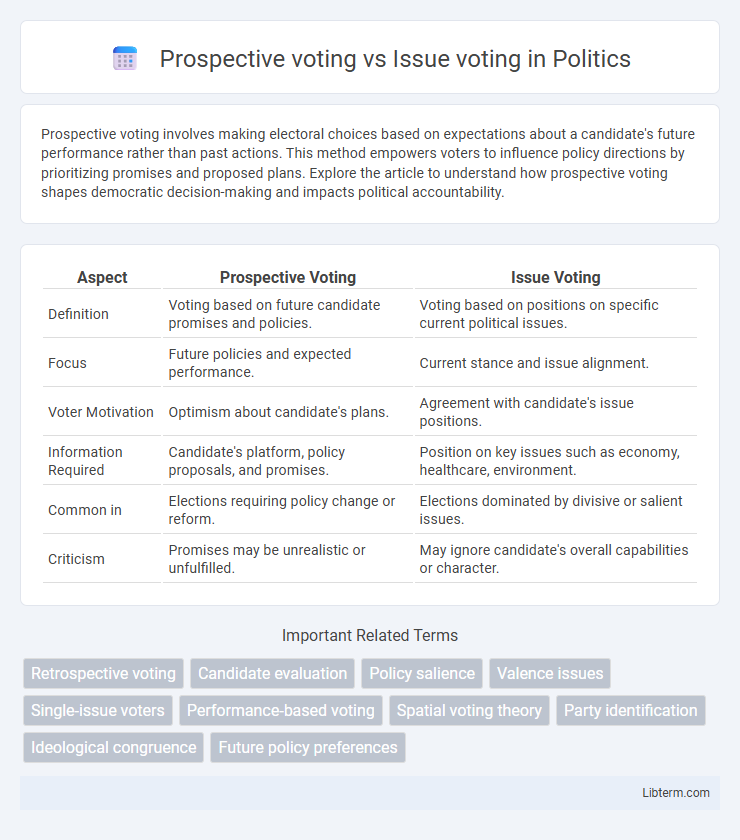Prospective voting involves making electoral choices based on expectations about a candidate's future performance rather than past actions. This method empowers voters to influence policy directions by prioritizing promises and proposed plans. Explore the article to understand how prospective voting shapes democratic decision-making and impacts political accountability.
Table of Comparison
| Aspect | Prospective Voting | Issue Voting |
|---|---|---|
| Definition | Voting based on future candidate promises and policies. | Voting based on positions on specific current political issues. |
| Focus | Future policies and expected performance. | Current stance and issue alignment. |
| Voter Motivation | Optimism about candidate's plans. | Agreement with candidate's issue positions. |
| Information Required | Candidate's platform, policy proposals, and promises. | Position on key issues such as economy, healthcare, environment. |
| Common in | Elections requiring policy change or reform. | Elections dominated by divisive or salient issues. |
| Criticism | Promises may be unrealistic or unfulfilled. | May ignore candidate's overall capabilities or character. |
Understanding Prospective Voting
Prospective voting involves voters evaluating candidates based on their anticipated future policies and potential impact, emphasizing forward-looking decision-making. This type of voting requires a clear understanding of a candidate's proposed plans and the likelihood of their success in implementing those policies. Unlike issue voting, which is centered on current or past performance on specific topics, prospective voting prioritizes expectations about future governance and policy outcomes.
Defining Issue Voting
Issue voting refers to the electoral behavior where voters base their choices primarily on specific political issues or policies rather than party loyalty or candidate personality. This form of voting emphasizes alignment with a candidate's stance on key matters such as the economy, healthcare, or immigration. Distinct from prospective voting, which centers on expectations of future performance, issue voting concentrates on evaluating existing or past policy positions to guide electoral decisions.
Key Differences Between Prospective and Issue Voting
Prospective voting emphasizes voters' forecasts about candidates' future performance and policies, while issue voting centers on voters' positions regarding specific political issues. Key differences include prospective voting's reliance on expectations and candidate promises contrasted with issue voting's basis on current stances and issue congruence. Prospective voting prioritizes policy outcomes and leadership qualities, whereas issue voting focuses on alignment with one or more salient political issues.
How Voters Make Decisions: Future vs. Issues
Prospective voting centers on voters making decisions based on candidates' future policies and promises, evaluating their potential impact on economic growth, healthcare, or education reform. Issue voting involves selecting candidates who align with voters' current opinions on specific topics like climate change, immigration, or taxation. Both methods influence electoral outcomes by reflecting either anticipated policy effectiveness or present-day ideological alignment.
Factors Influencing Prospective Voting
Prospective voting is influenced by voters' expectations about future policy outcomes and the candidates' proposed platforms, emphasizing the importance of candidates' credibility and clarity in articulating their plans. Voter engagement and access to comprehensive information about candidates' promises and potential policy impacts significantly shape prospective voting behavior. Psychological factors, such as optimism or pessimism about the political climate, also play a critical role in determining whether voters base their decisions on anticipated future benefits.
Factors Influencing Issue Voting
Issue voting is primarily influenced by voters' awareness of specific policy positions and the perceived relevance of these issues to their personal lives. Factors such as media coverage, political debates, and cognitive biases shape how voters prioritize issues and evaluate candidates' stances. Demographic characteristics, including education level and political knowledge, also play a significant role in determining how effectively voters can engage in issue-based decision-making.
Impact on Election Outcomes
Prospective voting, where voters base decisions on candidates' future plans and policies, often leads to election outcomes that reflect public expectations for change or stability in government direction. Issue voting prioritizes specific policy positions, influencing election results by mobilizing voters concerned with particular topics like healthcare or the economy. The impact on election outcomes differs as prospective voting encourages broader evaluations of candidates, whereas issue voting can create sharper divides based on key policy debates.
Advantages of Prospective Voting
Prospective voting allows voters to evaluate candidates based on future policies and promises, offering a forward-looking approach that encourages accountability and long-term planning. It helps in promoting policy innovation by supporting candidates who present clear, actionable agendas tailored to current societal needs. This type of voting fosters democratic engagement by motivating voters to consider the potential impact of leadership before making decisions at the polls.
Benefits of Issue Voting
Issue voting empowers voters to choose candidates based on specific policy positions, enhancing democratic accountability by aligning electoral outcomes with public priorities. This method encourages informed decisions, as voters assess how candidates' stances on critical issues impact their lives and communities. Issue voting also promotes policy-driven campaigns, fostering political debates centered on substantive concerns rather than personality or party loyalty.
Prospective Voting vs Issue Voting: Which Prevails Today?
Prospective voting relies on voters' evaluation of candidates' future policies and promises, while issue voting centers on specific policy positions or past actions on key topics. Contemporary electoral research shows that issue voting often prevails due to increased political polarization and media focus on hot-button issues, making voters more responsive to concrete stances rather than abstract future plans. However, prospective voting remains significant in elections where clear policy differences exist and voters seek long-term vision, particularly in presidential races and major legislative contests.
Prospective voting Infographic

 libterm.com
libterm.com